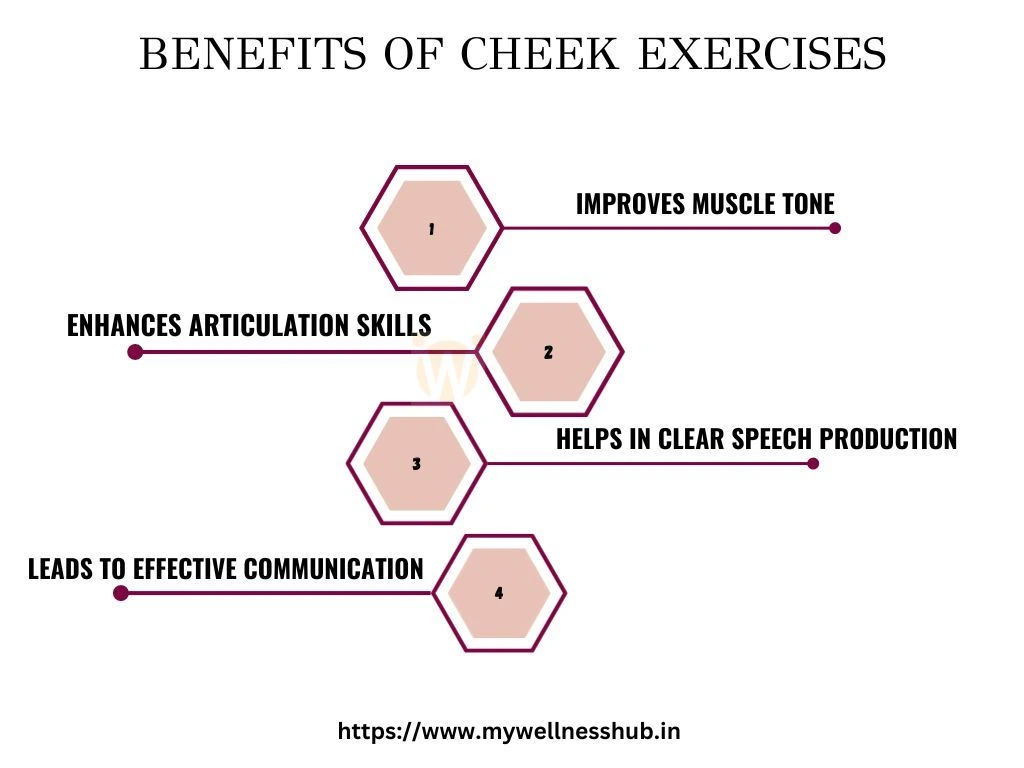Oral Motor Exercises: Exercises for Strengthening Cheeks
By Rajini D
Last Updated: November 22, 2023
Speech is an important method of expression. In children, any concerns related to speech should be addressed as early as possible. It is necessary to improve the speech and language skills of children so as to be on par with their speech and language milestones. To improve your child’s oral motor skills and muscle control, strengthening the parts of the mouth is necessary. Besides other parts of the mouth, cheeks play an important role in coordinating speech and airflow throughout. Speech and language development is a multifaceted process that involves the coordination and strength of various muscles, including those in the face and mouth. Cheek exercises play a pivotal role in enhancing overall muscle control, coordination, and flexibility in these vital areas. Cheek muscles contribute to the overall strength, coordination, and flexibility of the muscles in the mouth and face. This article explores the benefits of cheek exercises for speech and language development and provides effective exercises to incorporate into a comprehensive program.
Why is it essential to do cheek exercises?
Performing these cheek exercises is important for better speech production and improving oral motor skills. They enhance the speech and language development of an individual. Here are some reasons why cheek exercises are necessary.
Benefits of Cheek Exercises for Speech and Language Development:

Articulation improvement:
Articulation is important for clear communication. Strengthening the cheek muscles can improve control and coordination, leading to clearer speech sounds and precise articulation. For certain speech sounds, having strong cheek muscles can provide better clarity in speech. Strengthening the cheek muscles facilitates the production of specific speech sounds, enhancing overall speech clarity and intelligibility.
Facial muscle control:
Natural and effective facial expressions are possible with strong facial muscles. Making your child do cheek exercises can control the function of facial muscles in a structured way and improve coordination during expressions. Engaging in cheek exercises enhances overall facial muscle control, resulting in more natural and expressive facial movements during communication. Improved muscle control facilitates nonverbal communication, supporting the effective conveyance of emotions and intentions during speech and language interactions.
Oral Motor Skills Development:
Cheek exercises contribute to the development of crucial oral motor skills necessary for speaking, eating, and swallowing. Strengthening and coordinating the cheek muscles will support overall oral motor function. It promotes better control during speech production and other oral activities.
Speech Clarity Enhancement:
Strengthening the cheek muscles leads to improved speech clarity and precision as these muscles play a crucial role in shaping the oral cavity for the production of specific speech sounds. Enhanced muscle strength and control facilitate the production of a wide range of speech sounds, contributing to more effective communication.
Overall Communication Skills Improvement:
Incorporating cheek exercises into a comprehensive speech and language development program positively impacts overall communication skills. Enhanced muscle strength, coordination, and control in the cheeks contribute to improved speech production, facial expressions, and nonverbal communication, leading to more effective interactions and better social engagement.
Effective Cheek Exercises for Speech and Language Development:
Cheek Puffing:
Puffing out the cheeks with air and holding the position for a few seconds strengthens the muscles, improving oral motor control and coordination necessary for speech production. You can make your child do this by modeling. Let the child hold this cheek puffing for 5 to 10 seconds.
Cheek Resistance:
Applying gentle pressure to the cheeks with fingertips while pushing them inward helps build muscle strength, improving muscle tone and control in the cheek area for better articulation. You may do this by holding your child’s cheeks with both hands.
Cheek Smiling:
Engaging in various smiling exercises that involve the muscles in the cheeks contributes to better muscle coordination and flexibility, promoting natural facial expressions during communication.
Cheek Stretches:
Performing gentle stretching movements for the cheeks, such as pulling the corners of the mouth outward, increases muscle flexibility and reduces tension, enhancing overall oral motor function. You can model by doing this, sitting before your child and helping them understand.
Cheek Massage:
Circular massages on the cheeks increase blood flow and promote relaxation, relieving tension in the facial muscles and supporting better muscle control during speech and language activities. You can engage your child by chatting with him/her while performing this exercise. Massage each at least for 5 to 10 seconds for each cheek.
Inside and Outside Cheek Massage:
Massaging the inside and outside of the cheeks helps improve blood circulation, flexibility, and muscle control, contributing to overall oral motor skills development.
Blowing Exercises:
Teaching blowing exercises with varying materials, from thermocol balls to balloons, enhances oral motor skills. Gradually increasing the density of materials improves muscle strength and control for speech production.
Incorporating Cheek Exercises into a Comprehensive Program:
To maximize the benefits of cheek exercises, it is advisable to integrate them into a comprehensive speech and language development program under the guidance of a speech-language pathologist or a healthcare professional specializing in speech therapy. These professionals can provide tailored exercises and techniques to address specific speech and language needs, leading to improved oral motor skills and enhanced speech production abilities.
Wellness Hub has a group of experienced and empathetic speech and language therapists who can provide individualized therapy programs after thorough analysis and effective treatment plans. Our Speech Basics app is an added advantage that helps individuals continue therapy even after the sessions.
Frequently Asked Questions:
1: Why are cheek exercises important for speech?
A: Strong cheek muscles help control airflow and mouth movements, leading to clearer pronunciation, better facial expressions, and improved overall communication.
2: How do cheek exercises benefit articulation?
A: Strong cheeks provide support for producing certain speech sounds, especially those requiring precise mouth shaping. This leads to clearer articulation and reduces slurred speech.
3: Can cheek exercises help my child develop facial expressions?
A: Absolutely! Facial muscles, including cheeks, play a crucial role in expressing emotions. Cheek exercises improve muscle control, giving your child more natural and expressive facial expressions.
4: Are there any specific cheek exercises for speech clarity?
A: Yes! Exercises like cheek puffing, cheek resistance, smiling, and stretching all target different muscle groups and improve overall oral motor control, leading to clearer speech.
5: Should I consult a speech therapist for my child’s speech development?
A: While cheek exercises can be helpful, consulting a speech therapist is recommended if your child has concerns with speech clarity, language development, or oral motor skills. They can assess your child’s needs and create a personalized therapy plan for optimal results.
6: Where can I find a speech therapist near me?
A: Our Wellness Hub has a team of experienced and empathetic speech-language therapists who can provide individualized therapy programs after thorough analysis. Check out our website for more information!
About the Author:
Rajini, Speech-Language Pathologist:
Rajini is a dedicated Speech-Language Pathologist with a focus on developmental speech and language disorders in children and rehabilitation in adults. With a passion for helping each individual find their voice, Rajini brings a wealth of experience and a heartfelt approach to therapy. At Wellness Hub, she’s part of a team that values innovation, compassion, and results-driven practices.
Book your Free Consultation Today
Parent/Caregiver Info:
Client’s Details:
* Error Message








